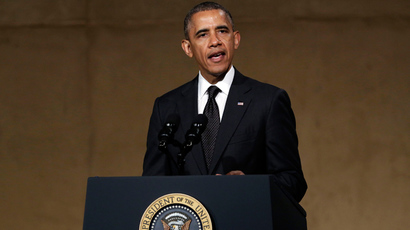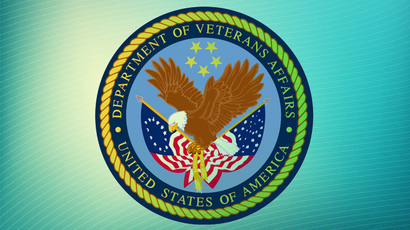Veterangate: VA whistleblower says records of deceased vets were altered

A Veteran Affairs employee has come forward claiming that government officials doctored the medial records of deceased veterans in order to hide the fact that they died waiting for medical care.
Speaking during an interview with CNN that aired Monday, scheduling clerk Pauline DeWenter of the Phoenix, Arizona veterans facility said she has “surrendered evidence” to the Federal Bureau of Investigation revealing that vets were not only placed on a secret waiting list for the purposes of maintaining the illusion that patients were receiving timely care, but also that those who died waiting for appointments had their records changed to indicate they were still alive.
According to DeWenter, there were at least seven different occasions in which the records of deceased veterans were altered. Originally, she documented the details of a veteran’s death only to find her work written over by another individual. This practice had even occurred as recently as a few weeks ago, she said, amid investigations into whether or not delayed medical appointments really did result in fatalities.
To DeWenter, the reason for the doctored records was clear: Someone wanted to place the deceased veterans back on the electronic waiting list so that it looked like they were still alive.
"I would say (it was done to) hide the fact. Because it is marked a death. And that death needs to be reported,” she told CNN. “So if you change that to, 'entered in error' or, my personal favorite, 'no longer necessary,' that makes the death go away. So the death would never be reported then."
Additionally, DeWenter confirmed the existence of a “secret waiting list,” onto which requests for new appointments were placed and subsequently forgotten about. Meanwhile, the electronic waiting list continued to make it look like patients were receiving care within the 14-day period mandated by the federal government – a rule that, when followed and reported, resulted in bonus pay for senior staff.
As for where those new appointment requests went, "They went into a desk drawer,” she said.
By early 2013, there were more than 1,700 patients waiting for appointments and 40 new requests a day. In addition to dealing with a lack of staff, DeWenter also had to try and accommodate specific appointment requests coming from doctors and nurses for patients who had no time to wait. This resulted in even further delays for those previously waiting.
“That really overtook even the wait list," she said. "Because now I have a consult where veterans are very sick. So I have to ease up on the wait list. It sounds so wrong to say, but I tried to work these scheduled appointments so at least I felt the sickest of the sick were being treated."
DeWenter was convinced she had to come forward after calling a veteran to inform him that, months after his initial request, an appointment was finally ready. He came in previously because he was urinating blood, but by the time DeWenter called his family, he had already passed away. She told the Office of the Inspector General everything she knew, but when that did not lead to action, she went to the press.
When CNN asked the Veteran Affairs Department to comment on the allegations, it responded with the following statement:
"As Acting Secretary Gibson has said at VA facilities around the country, we must work together to fix the unacceptable, systemic problems in accessing VA healthcare. We know that in many communities, including Phoenix, veterans wait too long for the care they've earned and deserve. That's why VA is taking action to accelerate access to care and reaching out to veterans to get them off wait lists and into clinics.
"We respect the independent review and recommendations of the Office of Inspector General (OIG) regarding systemic issues with patient scheduling and access, and we await the OIG's final review."
These allegations are the latest to come out regarding the long wait times not just in Phoenix, but in multiple jurisdictions across the United States. As RT reported earlier this month, an audit of the VA department found that over 100,000 veterans across more than 700 facilities are struggling to receive timely care.
Despite records showing that the White House was warned not to trust the reports coming in from various veterans’ facilities more than five years ago, it’s unclear what, if anything, was done to address the situation. The scandal has already forced the resignation of VA Secretary Eric Shinseki, and President Obama said other terminations could follow.














